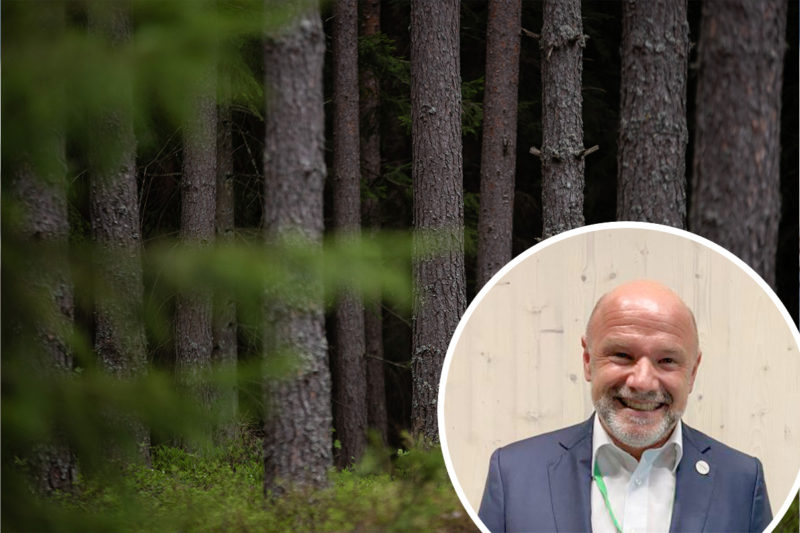IUFRO Executive Director: ’EU Commission shows lack of informedness on forest matters’

The thought that EU proposals on forest and forestry are directly applicable to all Member States – even though conditions vary from one MS to the next – is erroneous, says Alexander Buck, Executive Director of the International Union of Forest Research Organizations.
According to Alexander Buck, Executive Director of the International Union of Forest Research Organizations (IUFRO), too few forest sector professionals are involved in the preparation of the EU Commission’s proposals.
’With the great number of proposals affecting forests either directly or indirectly, it can be seen that information on forests and forest management is deficient,’ Buck says in an interview with the communication and media agency Audiomedia [in Finnish].
In Buck’s opinion, the conception that forest-related proposals are directly applicable to all Member States despite their differences is a greater problem.
’Even if Austria, Sweden and Finland are more or less similar in terms of forestry, EU proposals are not applicable to all Member States.’
Among the EU Member States, Finland and Sweden are situated in the boreal coniferous zone. In the north of these countries there is also some tundra, either open or with stunted trees. Central Europe is situated in the temperate zone of deciduous forests, and Southern Europe is in the Mediterranean zone. There is also some grass steppe in East Europe, such as in Romania.
’Facts should be communicated more effectively’
As for communication between decision-makers and other actors, Buck describes it as challenging.
’We must be able to communicate facts more effectively and professionally, and to get our message across to the various stakeholder groups and social media users.’
Forests that grow and are renewed have a great significance as carbon sinks and for the move away from fossil-based products. Despite this, the EU climate policy in particular relies too heavily on forests in solving climate issues, Buck feels.
I am extremely doubtful about the way forestry is represented in EU proposals, as a one-sided solution to the climate problem, seeing that the paramount task is actually to cut back on the use of fossil materials.
’I am extremely doubtful about the way forestry is represented in EU proposals, as a one-sided solution to the climate problem, seeing that the paramount task is actually to cut back on the use of fossil materials,’ Buck says.
As an example, the EU regulation on deforestation of last June stipulates a labour-intensive identification system for keeping track of wood raw material, despite the fact that forestry does not cause deforestation everywhere. In Finland, for example, fellings do not lead to a change in land use, for legislation requires that the forest must be regenerated.
Researchers must remain neutral
In Buck’s view, forest debate in Europe is polarized.
’Since the debate participants consist of politicians, researchers, ENGOs and activists, the key issue is how to harmonise the goals of both forest conservation and forestry.’
According to Buck, for research to be credible, the researchers must stick to their role and avoid becoming participants in forest debate.
’I know that various research communities strive to influence the EU Commission, and this may weaken the credibility of research as a body with a uniform message.’
The IUFRO, led by Buck, has a science-oriented agenda. Its task is to generate scientific assessments, reports and reviews for decision-makers. The IUFRO is a global collaboration network of forest sciences. It brings together about 650 member organisations and hundreds of individual researchers from over 125 countries.
’We strive to increase understanding on the ecological, financial and social dimensions of forests and forestry, and to generate research-based information for decision-making.’
Forest-related research in Finland is of a high level, Buck finds.
’Finland is a leading example in such things as how to create functional cooperation between the private sector, including industry, and the scientific community.’
Compensations for forest owners
Buck calls for the setting up of systems enabling forest owners to gain an income from the forests they are managing, even in the future.
’If people want to conserve forests as carbon storages and to create ecosystem services for recreational use, then forest owners must be compensated for the loss of timber sales revenue.’
Buck calls for political action by decision-makers to encourage research and development of new wood-based products and wood construction.
Forests and forestry have proved their excellent sustainability for hundreds of years, and the experience thus gained can also be used in the future. We have learned to adapt in the past, and we will also adapt in the future.
He says that the sector should be allocated RDI funds for developing new products. Funds are also needed for collating and synthesizing research information to serve decision-making related to forests and forestry.
’Owing to the worldwide population increase, an enormous number of dwellings and construction will be needed all over the world, and because of this, the use of renewable natural resources is increased.’
Ultimately, Buck says he has a positive feeling about the future.
’Forests and forestry have proved their excellent sustainability for hundreds of years, and the experience thus gained can also be used in the future. We have learned to adapt in the past, and we will also adapt in the future. Research may play a big part in the comprehensive utilization of the potential of forests,’ Buck concludes in the interview with Audiomedia.
Read more: Forest sector buckles down to comply with Deforestation Regulation
Read more: EU nature restoration regulation: Experts demand more national freedom